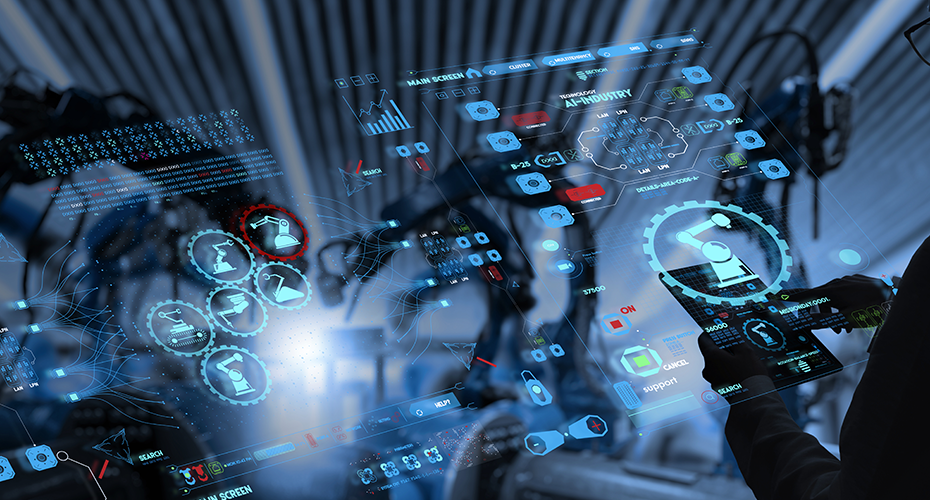![5 Ways Automation Humanizes the Workplace [Plus 1 Bonus]](https://s40886.pcdn.co/wp-content/uploads/2022/06/AdobeStock_411736181-scaled-1-735x300.jpeg)
5 Ways Automation Humanizes the Workplace [Plus 1 Bonus]
![5 Ways Automation Humanizes the Workplace [Plus 1 Bonus]](https://s40886.pcdn.co/wp-content/uploads/2022/06/AdobeStock_411736181-scaled-1-735x300.jpeg)
When you think of automation, you may associate it with a lack of humans. But in this article, we are going to argue just the opposite. Ahead, we will discuss how automation is helping improve the human experience in the workplace in 6 key areas (plus 1 bonus).
History of Workplace Automation
Throughout history, people have pursued ways to improve production and efficiency. Early forms of automation can be traced back to the 1st Century BC. Automation has looked different over the years, but the idea of working smarter not harder has prevailed.
Let’s take a brief look at a historical timeline of events and how people created change in the workplace with automation:
- 1st Century BC: Water Wheels
- 9th Century: Advancements in Mill Machinery
- 16th Century: William Lee mechanized the production of stockings
- 17th to 18th Century: Industrial Revolution
- 19th Century – Steam-powered machines fueled the production of items that at one time were hand-crafted by artisans
- 20th Century (the 1940s) – The term “automation,” as it related to the automatic handling of parts in the metalworking process, was conceived by the Ford Motor Company
- Later in the century, the use of robots became more prevalent in vehicle manufacturing;
- In 1979 a television ad, offering a glimpse into production of the new Strada ran with a tagline reading “Handbuilt by Robots”
- 20th to 21st Century: The advent of digitized automation with software bots
Will Automation Replace Humans?
As automation has become more commonplace, it’s sparked a fear amongst the human workforce that they will be replaced by autonomous inventions, leading to mass lay-offs and increasing unemployment rates. But automation is here to help us, not replace us. The reality is that automation and humans complement each other.
Yes, there are some aspects of job roles that will become automated. But from the era of automation emerges new “jobs of tomorrow,” creating new opportunities for knowledge workers. Plus, it’s unlikely that technology will ever be able to replicate the level of creative, critical, and interpersonal skills humans are capable of.
Cultivating a work environment in which digital workers and human workers can coexist in harmony will help you deliver more efficient and more personalized services than ever before.
6 Ways Automation can Help Improve Human Interactions in the Workplace
AI can increase and enhance human interaction in the workplace. Mundane, repetitive tasks can be accomplished through AI, thus increasing the time employees can spend with each other on much higher-level activities, like brainstorming, seeking out company growth opportunities and advanced-level project implementations.
1.) Empowers employees to focus on bigger and higher value tasks
Automating business processes frees up employees from tasks viewed as repetitive, menial, and mundane. Employees can concentrate on tasks that are more valuable and critical to the business, like relationship building and customer satisfaction.
2.) Creates new jobs
The adoption of new technologies, including automation, is reflected by “jobs of tomorrow,” emerging positions needed to be filled by humans. These jobs are set to grow by 51% and projected to present 6.1 million job opportunities globally.
3.) Upskilled human workforce
Simplifying monotonous, physically laborious, and quantitative skills with automation opens doors for knowledge workers who were once responsible for these tasks. Employees can learn new technical skills to manage the automation or train for an interpersonal position in customer service or employee experience.
4.) More satisfied employees
Free from the boring aspects of their jobs, knowledge workers feel more challenged, fulfilled, and, in turn, satisfied with their jobs.
5.) Improves customer service
Utilizing automation tools can help streamline and simply the customer service experience. By speeding up the process and removing human error, customers are much more satisfied.
Bonus: Enables hiring of top talent
One way automation helps humanize the workplace not often thought of is its positive impacts on talent acquisition. The automation of mundane, routine tasks helps HR free up their time to concentrate on recruiting efforts. The extra time and effort spent on recruiting will increase the likelihood of attracting and hiring top talent. And that is a direct way automation humanizes the workforce.
Automation for a Humanized Workplace
Automation is defined as technologies that reduce human intervention in processes. Naturally, the increasing adoption of automation instills fear amongst employees that they may be replaced. However, automation exists to augment the human workforce to be better, faster, and stronger than ever before. By empowering workers to focus on more valuable tasks, creating new jobs, upskilling knowledge workers, satisfying employees, improving customer service, and enabling the hiring of top talent, automation is the ideal complement to the human workforce. Together digital workers and human workers can join forces to create a happier and more successful workplace.
For help with your automation technologies, check out Apexon’s Intelligent Automation services or get in touch directly using the form below.




